- Home
- Gaelen Foley
The Secrets of a Scoundrel Page 16
The Secrets of a Scoundrel Read online
Page 16
He shrugged. Because I am.
“Beautiful fool,” she whispered as if she could read his mind.
Suddenly, the ship’s bell clanged, and the cry went out on the decks above them, announcing they had reached the harbor of Calais.
Nick looked at her ruefully as she raised her head.
Stepping back from his embrace, she gave him a tender smile, and the possibility of another kiss was set aside for now.
Interrupted, to be sure, but not at all forgotten.
Then she took his hand. “Come on, you.” She pulled him back to their stateroom to collect their things. Nick followed her, in something of a trance. He felt so strange.
So this is what it’s like to be an actual person, he thought.
Instead of the bloody angel of death.
Chapter 11
The packet ship dropped anchor, and soon they were lowered in a rowboat down into the dip and sway of the waves to be brought ashore.
The rocking, dizzying span from shipboard to land as the sailors plied the oars was good preparation, Gin thought, for entering the whimsical upside-down world that was France, at least to her English brain.
Life was different there. Things that in England were crisp, clean, straight, and narrow, in France became curved, swirling, flowery, and fanciful.
The people were different, too. Where Englishmen made it a point of pride to conceal their true feelings, the French expressed every passing shade of emotion on their faces: a flick of an eyebrow, a curl of the lip, or the world-famous Gallic shrug.
Englishmen liked to agree as much as honorably possible for etiquette’s sake; Frenchmen loved to argue about everything under the sun for intellectual stimulation—or mere entertainment. The two tribes had completely different senses of humor, too, and even insulted people differently. The English could cut some poor soul dead with frosty politeness, whereas the French had perfected the art of ridicule centuries ago.
No wonder the war had taken twenty years, she mused wryly. If only their nations could have remained friends, as so many French and English aristocrats were in Society, where they copied each other’s fashions and frequently swapped wives. Gin, like most of the world, was simply glad the dreadful war was over.
At last, her stomach turning from the pitching of the waves, she accepted Nick’s offered hand and stepped out of the unstable rowboat onto the beach. The first order of business for all arriving passengers was the short, obligatory visit to the Customs House. After filing along through the line, an official checked their papers and asked a few questions about the nature of their visit.
In Calais, they took a room for the night, but their trek was far from over. From there, they had a grueling, two-day carriage ride before they reached the capital.
Given the pitted roads, the worn springs of their hired barouche, and all the jarring, Gin arrived admiring the splendors of Paris feeling like every bone in her body was broken.
But at least she discovered one thing their countries had in common: Carriage drivers in the City of Light were equally as mad as those in London.
She was glad Nick was handling the ribbons, expertly navigating the busy maze of broad, new, imperial avenues and the dark, cramped medieval streets. Merely riding along as passenger gave her half a mind to reach for the smelling salts. Finally, they reached their journey’s end just as all the churches in the city began to toll the hour.
The light had faded. In Catholic country, it was time for evening vespers.
Then Nick brought the carriage to a weary halt at last outside a quaint little inn painted ocher with blue shutters and tiny balconies overlooking the cobbled street. A gold-lettered sign above the door pronounced it LA MAISON DE MAXIME. And like a budding poet sipping coffee at a café, it sat utterly ignoring the opulent monstrosity of the L’Hôtel Grande Alexandre in view across the street.
The little inn’s rival was a pillared palace that Gin immediately suspected had once been the home of some guillotined aristocrat before being converted to expensive lodgings for travelers. It had huge, arched windows through which giant chandeliers shone, a pair of gilded lions crouching outside the door.
That was the place where Hugh Lowell had instructed them to go in order to finalize their participation in the Bacchus Bazaar, she mused.
Nick turned to her discreetly. “I’ll get us a balcony room at the front of the house here.” He nodded at cozy little Maxime’s. “This should give a decent view of the people coming and going from the Alexandre. Get a sense of the competition.”
She nodded, then let him help her down from the carriage with a small groan of pain.
He frowned in concern.
“I’m fine,” she mumbled, as they went into the lobby. “Just a bit sore.”
“Your back?”
“All over. Must be because I’m so dashed old,” she taunted, leaning on him as she rather hobbled into the lobby.
“God, some people can’t take a joke! You’re not old.”
“Well, I feel about ninety years old at the moment,” she grumbled.
“Don’t worry, Gran. You can lie down as soon as we get our room.”
“One room?” she countered under her breath as they stepped inside. She gave him a droll stare. “Dare we?”
“With such people in the neighborhood, we’d better stick together.”
“And get our story straight this time,” she added pointedly.
He sent her a sardonic look.
Crossing to the desk in the lobby, they presented themselves as husband and wife.
It was becoming easier every day to carry off the charade though they had only kissed once. Traveling around the clock and living together in such close quarters had bred a familiarity between them that already felt surprisingly natural.
In any case, it was blissful to know they would have a home base of operations for a few nights and would not have to be in motion with the breaking of the dawn.
The maitre d’hôtel was a funny little whirlwind of a Frenchman with a moustache and an apron, who made them immediately welcome.
He neither stopped moving nor talking as he dashed about, running his establishment with obvious pride. “You have shown excellent taste, my friends, by choosing our humble maison over that gaudy horreur down ze street.”
Gin fought a smile. She had not thought “humble” was a word used by any self-respecting Parisian. “Are you Monsieur Maxime?” she inquired, assuming this to be the owner’s surname.
“Me? Non, non, madame. I am Claude. Claude de Vence. Maxime is my wife. She is in charge of the kitchens. Her sister runs the boulangerie next door. All our bread is baked fresh there. Me, I manage ze hotel—along with my useless son. Georges! Come, we have new guests!” he shouted abruptly over his shoulder. “Will you wish for supper? Our food is—” He kissed his fingertips. “Exquisite!”
“Certainly, we will. We’re very hungry,” Nick said, a trace of warm amusement in his voice.
Monsieur de Vence was thrilled to hear it. “Excellent! Let me show you to your room.”
“Ah, could we have one at the front of the house, please?”
He frowned. “It’s quieter in ze back.”
“That’s all right. We enjoy watching life go by.”
“I see.” Monsieur le Vence narrowed his eyes and nodded in approval of these rather French sentiments on the part of an always-hurrying Englishman. “I know we have one open on the second floor. But whether it is finished being cleaned yet, I do not know. Georges!”
A stream of French language tumbled from his lips as he called impatiently to his son.
It was not the sort of fashionable French Gin’s governess had ever taught her, but something a bit more earthy and piquant; but though she was rather lost on the exact translation, his meaning was clear enough. To be sure, she rec
ognized the harried look of a fellow parent to a teenaged son. Lord knew she had seen that vexed expression often enough in the mirror.
Running on seventeen-year-old time, the wiry lad eventually rushed into the lobby from the direction of the kitchens. “Oui, Papa?” He stared at Nick and Gin for a second with a wide-eyed blink.
“Go and check to make sure Room Nine is ready. Build ze fire while you are there.”
Georges bobbed his head, then whirled around, all gangly limbs, and scampered up the steps. Monsieur de Vence smiled at them and tapped his fingers on the desk; while Gin admired a charming watercolor painting of the Seine in the lobby, Nick finished signing them in, then made arrangements with the innkeeper to return the barouche and horses to the Paris station of the same livery company from which they’d hired them.
At last, the boy returned. “C’est preparée toujours, Papa.”
The father nodded at their luggage. “Carry up their bags.”
Before long, they were all traipsing up the stairs behind their skinny young porter. Poor Georges could not possibly see where he was going, staggering under a tower of baggage that weighed more than himself. But, somehow, he pressed on.
The innkeeper carried another trunk behind them, while Nick hefted the black case that contained their weapons, as well as the strongbox where her jewelry and the emerald for the Bacchus Bazaar were squirreled away.
Zigzagging precariously ahead of them, the sweating Georges showed them to their room. The boy fairly collapsed under his load in the middle of the floor.
She rushed to catch the topmost box that slid off the stack in his arms. Then he set everything down, and she rewarded him with a franc for his heroics.
He looked at it, then at her, and bobbed with a bow of thanks.
The room was small and cheerful, unpretentious, a quaint box of creamy plaster walls and ceiling, garden-floral fabrics, and timeworn furniture carved with swirly, round, rococo touches. The fire was already blazing in the modest hearth, warming the space.
Gin felt instantly at home. She let out a great sigh and slowly took off her coat, while Nick stepped into the doorway to confirm that they would have the house supper for two, along with two bottles of wine, one red, one white, of whatever vintage Monsieur de Vence thought best for them.
“It won’t be long,” their new friend assured them.
Nick nodded in thanks and finally closed the door. At once, he began searching the room for a hiding place in which to conceal the strongbox. He soon found a place to secret it away in a dark upper shelf at the back of the armoire.
Gin felt too battered to be of any help whatever. She simply unlocked the traveling trunk that contained her various nightgowns then dragged herself off behind the painted screen in the corner. While she wearily changed clothes, Nick took out the telescope and evaluated the view of the Alexandre from their balcony.
He was just shutting the narrow little doors that gave access to the balcony when she stepped out from behind the screen, still tying the cloth belt of her dressing gown around her waist.
He smiled ruefully as he pulled the curtains shut over the balcony doors for warmth. “How are you feeling?”
“Like the whole field of racehorses ran over me at the derby.”
He smiled fondly. “I’m sure you’ll feel better after a good night’s sleep. Lie down here, on your stomach.”
“Why?” she asked suspiciously.
“Just do as you’re told for once.” He grabbed one of the pillows and placed it at the foot of the bed.
Warily, she lay on her stomach, facing the fire, her hands clasped under her chin.
“Now then.” Standing at the edge of the bed, he leaned down and began running his palms lightly down her back. “Tell me where it hurts.”
“Ow. There. Everywhere.” She flinched beneath his gentle touch.
“I’ll go easy on you, then.” And he did. Gradually, she relaxed under his strong, warm, clever hands massaging her, gliding smoothly, gently, over her aching body.
Bit by bit, as they waited for the food to be delivered, he stroked away the soreness, squeezing her shoulders, kneading his fingers deep into her knotted muscles, and spreading relaxation through her, replacing pain with soothing pleasure.
A sigh escaped her. “Mm, that’s good.”
“So tight,” he remarked in a throaty purr as he dealt with her aches and pains more aggressively now that he had taken the edge off. “There?”
“Yes.” It felt wonderful as he dug his knuckles into the knots in the small of her back and pressed his thumb into spots that she hadn’t even realized were hurting.
“Where did you learn how to do this?” she mumbled blissfully, resting her cheek on her folded arms.
“Just shut up and enjoy it,” he ordered with a smile in his voice. After a moment, he paused, inspired with some new way to pleasure her. “Why don’t we try . . . this. Don’t move.” He went and got her bag of toiletries, choosing a lavender-scented cream.
When he returned, he slipped her satin robe off her shoulders, freeing her arms one by one. He folded her dressing gown back across her hips, draping it over her bottom. “You’re going to like this,” he promised in a low and husky murmur.
Then he slicked his hands with some of the moisturizing cream and used it to deepen his massage.
Gin was in sheer heaven as his skillful hands caressed her, erasing grueling hours of travel. With a deft motion, he lowered the silk straps on her peignoir, baring her shoulders, and soon, his fingertips marched up the back of her neck with steady, gentle persuasion.
You are dangerous, she thought, as a sigh of bliss escaped her. There was only one way left that he could have pleasured her more . . .
After all, Paris was for lovers, and at this hour of night, there was nothing else to do.
Chapter 12
Nick was entranced by her beautiful skin.
It was intoxicating to feel the way the tough, proud, no-nonsense lady melted under his touch, her body turning supple, yielding under his caresses. If he could have found a reasonable excuse to justify hitching her silk peignoir up over her long, lithe legs and rubbing cream all over them, too, he would have done it. He wanted to touch every inch of her. But he didn’t dare. All of a sudden, he was deathly afraid of making any sort of mistake with her.
This remarkable woman took his breath away. Instead, he was all but mute with yearning, and finally, he flinched when a knock at the door brought her massage to an end.
An expected interruption.
Still, he bit his lip and closed his eyes, struggling to tamp down his hunger for her.
“You are an angel of mercy,” she purred, as he covered her up gently with her dressing gown again. Somehow he found the self-possession to go and answer the door.
It was, of course, Monsieur de Vence, delivering their feast on a wheeled cart. He left them to enjoy the house bill of fare, and it did not take long for them both to realize that his wife, the cook, was a born genius.
November meant truffle season in France, therefore the meal was launched in fine style with a silky white truffle soup with asparagus.
Bellies warmed by the soup, they eagerly hurried on to the fish course of sandre au beurre blanc, or roasted pike perch with butter. The fish had a succulent, flaky texture and strong, good, pure, simple flavors.
Next came the main course, hearty boeuf bourguignon, fragrant with the red Burgundy wine in which the meat had simmered until it was falling apart. There was a lighter offering to choose from: smoked pigeon breast bristling with rosemary springs and smeared with cooked apricots; as well as a side dish of tender roasted carrots sprinkled with parsley.
They were merry with wine by the time they paused for the cheese course, merely a pleasant stop along the way to dessert, as far as Nick was concerned.
“Du fromag
e, s’il vouz plait,” Lady Burke teased him with a tipsy toast, lifting her glass.
“The blue, the brie with apple compôte, or the goat cheese, madame?”
“Oui!” she answered, beckoning him toward her plate.
Her motions seemed unsteady. Her eyes shone a bit too bright. He did not remark upon her state of elevation but served her once again.
At last, they rewarded themselves with the sweets course—vanilla macaroons made into charming little sandwiches filled with sweet pistachio cream.
Nick picked up his wineglass, then reclined on his elbow on the bed, watching her lick the cream from between two macaroons.
“I think I’ve gained five pounds just now,” she remarked in a wryly philosophical tone. “Which makes me wonder.”
“About what?” he asked indulgently.
“Why Hugh Lowell doesn’t move to France?”
Nick started laughing.
“I mean it! He is obviously a great gourmand, and the food here . . . well, it’s France.”
“I don’t think they’d have him,” Nick drawled.
“Of course they would! He’s not so bad.”
Nick shrugged. “He was more cooperative than I expected, I admit.”
“That’s because I charmed him,” she replied.
“No, you frightened him, I think. God knows you frighten me.”
She sent him a long-suffering look. “How did you ever end up in debt to the likes of Hugh Lowell, anyway? Smart fellow like you. It seems . . . out of character.”
“Isn’t it obvious?” he countered warily. “Bad luck at the tables.”
She shook her head. “You perplex me. Why play there in the first place?”
He shrugged. “At first, it was just a matter of establishing my cover in that world. Gain his trust. I had to be convincing. And then, later on, oh, I don’t know. I guess I didn’t want anyone bothering me whenever I wanted to play.”
“You mean like Beauchamp and Montgomery, trying to stop you?”

 My Ruthless Prince
My Ruthless Prince Paladin's Prize
Paladin's Prize Duke of Storm
Duke of Storm Duke of Scandal (Moonlight Square, Book 1)
Duke of Scandal (Moonlight Square, Book 1) My Irresistible Earl
My Irresistible Earl Lady of Desire
Lady of Desire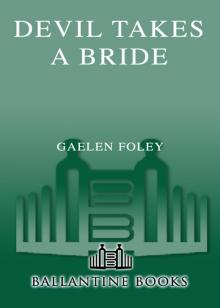 Devil Takes A Bride
Devil Takes A Bride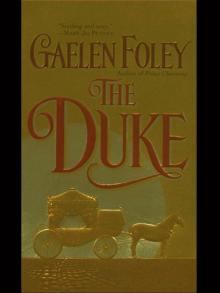 The Duke
The Duke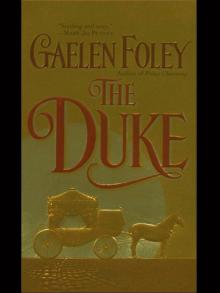 The Duke: The Knight Miscellany Series: Book 1
The Duke: The Knight Miscellany Series: Book 1 Her Secret Fantasy
Her Secret Fantasy Her Only Desire
Her Only Desire Lord of Fire
Lord of Fire My Wicked Marquess
My Wicked Marquess My Scandalous Viscount
My Scandalous Viscount Duke of Secrets (Moonlight Square, Book 2)
Duke of Secrets (Moonlight Square, Book 2)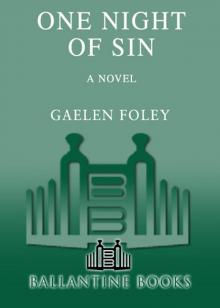 One Night of Sin
One Night of Sin The Secrets of a Scoundrel
The Secrets of a Scoundrel Dream of Me (Harmony Falls, Book 1)
Dream of Me (Harmony Falls, Book 1) His Wicked Kiss
His Wicked Kiss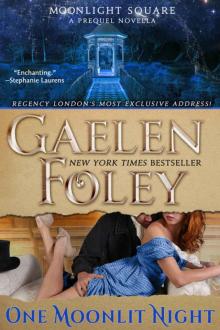 One Moonlit Night (Moonlight Square: A Prequel Novella)
One Moonlit Night (Moonlight Square: A Prequel Novella)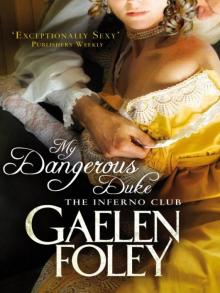 My Dangerous Duke
My Dangerous Duke